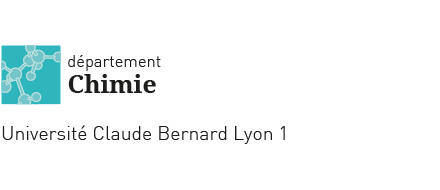Chemistry and Biochemistry
Activities
Chemistry at University Lyon 1 : National and International recognition through poles of competitivity.
The French Chemical Industry is the 5th producer in the world and the 2nd in Europe after Germany. It is placed 3rd among global chemical exporters and represents a key sector in national competitivity. Its contribution to the GDP in 2008 was estimated at 18.5 billion euros and has generated 182,140 jobs, or 720,000 if we also consider indirect employment (http://www.uic.fr).
The Rhone Alps region represents 15% of the total number of persons working in the French chemical industry and 25% of its research and development expenses. The Rhone valley is the 2nd region in France having a concentration of chemical sites employing more than 20 workers each.
Clean chemistry is a promising new sector which plays heavily on innovation to foster its growth. It works daily to improve our lives, health and comfort and is found in all professions dealing with: transport (automobiles, TGV, aeronautics, etc), health (development of bioactive molecules employed in medicines), farming, cosmetics, textiles, construction materials (green chemistry, pollution removal, etc), nanotechnology and leisure (DVD, flat screens, etc). None of these activities can develop without chemistry.
The Chemistry and Biochemistry Department, one of the 8 departments of the Faculty of Science and Technology of University Lyon 1 is at the heart of these activities and is conscious of their economic implications. It represents a strong research pole recognised by the national evaluation authorities. The Chemistry part is developing themes of research in partnership with the Lyon - Rhone Alps Environmental Chemistry pole of competitivity, i.e. AXELERA which has global reach. The Biochemistry section on the other hand is in partnership with the global competitivity pole of infectiology (Lyon Biopole) and is part of the Innovations in Infectiology Advanced Research Thematic Network (RTRA).
Truly speaking, the Chemistry and Biochemistry Department with its 1369 undergraduate students, 117 teaching and research staff, 63 technical and administrative personnel, some 200 CNRS staff, post-doctoral researchers and doctoral students distributed over 9 mixed research units - CNRS associated ones and two federated research structures, displays a huge research potential with strong interaction with the Ecole Nationale Supérieure and the engineering institutions (CPE, INSA, EPU). The research themes that are being developed in conjunction with the Lyon Bipole and Environment Chemistry poles of competitivity are: Biochemistry, Protein Biology and Chemistry, Molecular Recognition and Transduction, Infectiology, Bioactive Molecules, Hydrazines, Chemometrics, Formulation, Analytical Sciences, Multimaterials, Polymer Materials and Biomaterials.
The reputation of our research laboratories allows us to propose attractive training that is attuned to the socio-economic world.
The department offers a first degree course:
at the BAC+3 level: (2 general Licence degrees with a Chemistry or Biochemistry specialisation) as well as three professional courses at the same level entitled Metal Transformation, Plasturgy and Composite Materials and Energy and Climate Engineering, the latter in partnership with the Physics Department,
at the BAC +5 level: 5 Research and Professional Masters' Degrees of which two are open via apprenticeships:
Specialisations:
Physicochemical Control and Analysis (Euromaster label)
http://master-analyse-controle.univ-lyon1.fr
Biochemistry (co-organised with INSA)
http://biochimie.univ-lyon1.fr
Chemistry (in partnership with CPE-INSA-ENS Lyon)
http://master-chimie.univ-lyon1.fr
Materials (co-organised with INSA)
http://master-materiaux.univ-lyon1.fr
Science of Matter: (co-organised with ENS)
The Path of Chemistry


